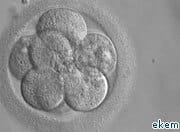Criticism has been faced by five UK research bodies, who are endorsing the genetic modification of human embryos and are calling for the UK to proceed with exploring such techniques.
Their statement was prompted by controversial developments in genetic research, including the use of a technique called Crispr-Cas9 which can edit genes.
Earlier this year, a team in China used the technique to alter an abnormal gene that causes a life-threatening blood disorder. They used abnormal embryos discarded by local fertility clinics.
Ethical concerns
Following the research, the US medical research agency said it would not fund the genetic modification of embryos due to serious safety and ethical concerns.
If embryos are genetically modified, ‘errors’ in the DNA could be passed into the human gene pool, and fears have also been raised about the prospect of designer babies.
Nevertheless, within the UK two Government research councils and three medical research groups say there should be an international debate about the issues involved.
Significant potential
The statement said: “We believe that genome editing technologies may hold significant potential for clinical application in the future; and we would be open to supporting the development of new therapeutic approaches should the evidence from research advance sufficiently to justify their use.”
The groups also said they recognise that there may be “future potential to apply genome editing in a clinical context using human germ cells or embryos, though this is prohibited by law in the UK”.
Fears of designer babies are not misplaced, nor are concerns over unequal access and genetic discrimination
The Guardian
The Wellcome Trust, which backed the recent legalisation of three-parent babies, co-signed the statement.
Global opposition
Dr David King, Director of Human Genetics Alert, warned that these UK groups are essentially condoning genetically modified babies, despite global opposition.
“The public must raise its voice in support of the strong international consensus against crossing this line. If we don’t, it is almost inevitable that we will end up in a market for ‘enhanced’ GM designer babies”, he said.
A Guardian editorial highlighted the prospect of “unexpected and harmful effects” that could be caused by genetic ‘tweaks’.
Burden
“The consequences could burden generations to come. Fears of designer babies are not misplaced, nor are concerns over unequal access and genetic discrimination”, the editorial added.
And science writer Michael Hanlon warned in The Daily Telegraph that allowing the genetic modification of embryos could lead to a society where people with Down’s syndrome and autism are eliminated.
“A world free of genetic disease, full of the super-bright, the beautiful and the fit may sound like heaven. But in reality it could resemble another place altogether”, he said.


